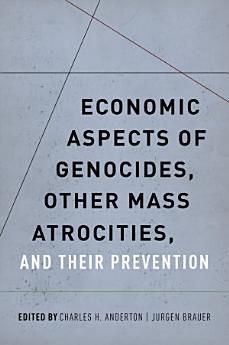Economic Aspects of Genocides, Other Mass Atrocities, and Their Prevention
Charles H. Anderton · Jurgen Brauer
May 2016 · Oxford University Press
Ebook
656
Pages
family_home
Eligible
info
reportRatings and reviews aren’t verified Learn More
About this ebook
Alongside other types of mass atrocities, genocide has received extensive scholarly, policy, and practitioner attention. Missing, however, is the contribution of economists to better understand and prevent such crimes. This edited collection by 41 accomplished scholars examines economic aspects of genocides, other mass atrocities, and their prevention. Chapters include numerous case studies (e.g., California's Yana people, Australia's Aborigines peoples, Stalin's killing of Ukrainians, Belarus, the Holocaust, Rwanda, DR Congo, Indonesia, Pakistan, Colombia, Mexico's drug wars, and the targeting of suspects during the Vietnam war), probing literature reviews, and completely novel work based on extraordinary country-specific datasets. Also included are chapters on the demographic, gendered, and economic class nature of genocide. Replete with research- and policy-relevant findings, new insights are derived from behavioral economics, law and economics, political economy, macroeconomic modeling, microeconomics, development economics, industrial organization, identity economics, and other fields. Analytical approaches include constrained optimization theory, game theory, and sophisticated statistical work in data-mining, econometrics, and forecasting. A foremost finding of the book concerns atrocity architects' purposeful, strategic use of violence, often manipulating nonrational proclivities among ordinary people to sway their participation in mass murder. Relatively understudied in the literature, the book also analyzes the options of victims before, during, and after mass violence. Further, the book shows how well-intended prevention efforts can backfire and increase violence, how wrong post-genocide design can entrench vested interests to reinforce exclusion of vulnerable peoples, and how businesses can become complicit in genocide. In addition to the necessity of healthy opportunities in employment, education, and key sectors in prevention work, the book shows why new genocide prevention laws and institutions must be based on reformulated incentives that consider insights from law and economics, behavioral economics, and collective action economics.
About the author
Dr. Charles H. Anderton is Professor of Economics and the W. Arthur Garrity Sr. Professor in Human Nature, Ethics and Society at the College of the Holy Cross, Worcester, MA, where he has taught since 1986. His course offerings include the economics of war and peace and genocide and mass killing: perspectives from the social sciences. His research on war and peace has been published in a variety of journals and edited volumes in economics, international relations, and related fields. Dr. Jurgen Brauer is Professor of Economics, Hull College of Business, Augusta University, Augusta, GA, and Visiting Professor of Economics, Chulalongkorn University, Bangkok, Thailand. Specializing in defense and peace economics, he is co-founder and co-editor of The Economics of Peace and Security Journal.
Rate this ebook
Tell us what you think.
Reading information
Smartphones and tablets
Install the Google Play Books app for Android and iPad/iPhone. It syncs automatically with your account and allows you to read online or offline wherever you are.
Laptops and computers
You can listen to audiobooks purchased on Google Play using your computer's web browser.
eReaders and other devices
To read on e-ink devices like Kobo eReaders, you'll need to download a file and transfer it to your device. Follow the detailed Help Center instructions to transfer the files to supported eReaders.





